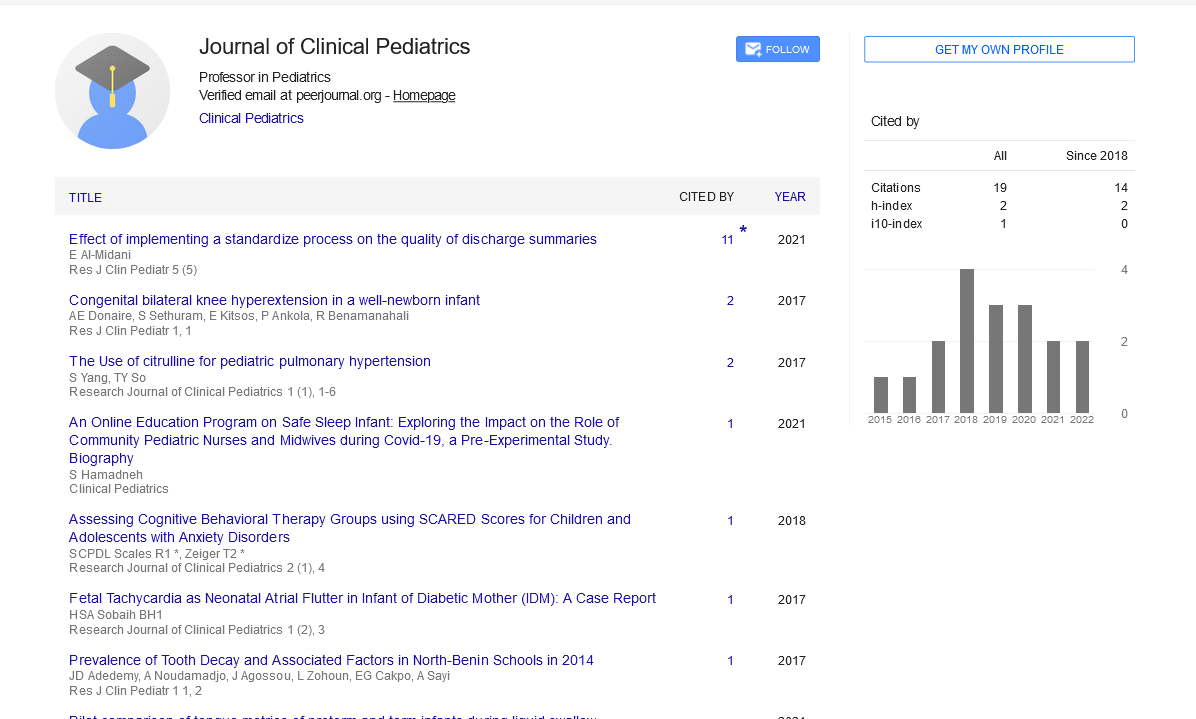Case Report, Res J Clin Pediatr Vol: 1 Issue: 2
Drug induced Acute Pancreatitis in an Adolescent with Seizure Disorder and Autism
Saeed W*, Standish-Parkin L, Gupta N and Mendez M
Department of Pediatrics, Lincoln Medical Center, NY-10451, USA
*Corresponding Author : Wajeeha Saeed, MD
Department of Pediatrics, Lincoln Medical Center, NY-10451, USA
Tel: 718-579-5030
E-mail: wjsaeed13@gmail.com
Received: March 31, 2017 Accepted: June 08, 2017 Published: June 15, 2017
Citation: Saeed W, Standish-Parkin L, Gupta N, Mendez M (2017) Drug induced Acute Pancreatitis in an Adolescent with Seizure Disorder and Autism. Res J Clin Pediatr 1:2.
Abstract
Drug induced pancreatitis (DIP) is a rare cause of acute pancreatitis in childhood. The development of pancreatitis, though rare, has been related to many drugs, including Valproic Acid (VPA), levetiracetam and Oxcarbamazepine. Here, we report a case of an autistic adolescent with epilepsy who developed pancreatitis likely related to the cumulative effect of the aforementioned drugs.
Keywords: Acute pancreatitis; Seizures; Anti-epileptics; Valproic acid; Autistism
Case Presentation
18-year-old Hispanic male with a history of seizure disorder and moderate intellectual disability presented to the emergency department with sudden onset abdominal pain associated with several episodes of non-bloody, non-bilious vomiting. The mother reported the patient was unable to characterize pain, but he was progressively getting worse and was unable to tolerate anything orally except water. There was no associated fever, jaundice, diarrhea, chest pain or dizziness, no history of cholelithiasis, trauma or alcohol use. Vital signs showed heart rate of 140 beats/min, respiratory rate 24/ min, blood pressure 140/100 mmHg and 97% saturation on room air. Physical exam revealed an obese, drowsy male in acute distress. Abdominal exam was remarkable for left upper quadrant tenderness with rigidity, but no guarding, no organomegaly, negative Murphy and Grey turner sign.
Past medical history was remarkable for congenital carnitine deficiency, meningitis at 4 months of age, seizure disorder since 4 months of age, attention deficit hyperactivity disorder (ADHD), Diabetes Mellitus (DM) type 2 and hypertension (HTN). Patient’s daily medications included Levocartine for carnitine deficiency; VPA (initially 750 mg, increased to 1000 mg twice a day six months ago) for past 18 years, Oxcarbazepine (600 mg twice a day) for past 2 years and levetiracetam (initially 600 mg, increased to 1000 mg twice a day 3 months ago) for the past 8 months for seizure disorder; methylphenidate, guanfacine and quetiapine for ADHD; metformin for a DM and hydrochlorothiazide and amlodipine for HTN.
Initial labs showed white blood cell count of 23,600 with 87.5% neutrophils, mild metabolic acidosis with hypocalcemia (Calcium 7.6 mg/dL), markedly elevated Lipase (14,150U/L) and mildly elevated amylase (984U/L). Liver function test was remarkable for hypoalbuminemia (Albumin 3 g/dl). Lactate was high (2.9 mmol/L) with normal Lactate dehydrogenase, slightly increased beta hydroxybutyrate (0.311 mmol/L) and a normal VPA level (63.4mcg/ ml). Urinalysis showed a specific gravity of 1.053.
Chest X-ray (CXR) was normal. Abdominal ultrasound revealed hepatomegaly, mild gallbladder wall thickening with pericholecystic fluid and small amount of free fluid in the abdomen. Computed Tomography (CT) of the abdomen and pelvis showed moderateseverity pancreatitis with some secondary inflammation of adjacent stomach/bowel (Figure 1).
Patient was admitted to the intensive care unit for management of acute pancreatitis and was started on pain control medications and aggressive intravenous fluid resuscitation. Due to a high suspicion of DIP, VPA and Oxcarbazepine were stopped and the patient was continued on Levetiracetam 1000mg twice a day.
On the second day of hospitalization, patient suffered from acute respiratory distress with hypoxia secondary to acute respiratory distress syndrome (ARDS) requiring intubation and ventilator support. CXR showed bilateral pleural effusion and pulmonary edema. It was attributed to multisystem organ failure due to pancreatitis. Patient was continued on fluid resuscitation through a central venous line. Hospital course was complicated by persistent fever spikes, nonoliguric acute kidney injury, HTN requiring antibiotics, furosemide and labetalol respectively. Patient responded well and pancreatitis slowly resolved with normalization of the laboratory results. Repeat abdominal & pelvic CT scan showed stable pancreatitis with less edema and no evidence of necrotizing pancreatitis or pseudocyst formation.
ARDS slowly resolved and CXR normalized. Patient was extubated on the fourteenth day of hospitalization and maintained good oxygenation on room air. He remained seizure free during the hospital stay and was discharged home in stable condition on Levetiracetam 1000mg twice a day. On neurology follow up, he remained seizure free on levetiracetam.
Discussion
Pancreatitis is an inflammatory condition, resulting from injury of the pancreas. There has been an increase in the incidence of acute pancreatitis in pediatric patients over the past two decades [1]. Common causes of acute pancreatitis in pediatric population include biliary disorders, systemic conditions, medications, trauma and idiopathic.
DIP attributes to about 13% of all cases of acute pancreatitis in the pediatric population. Multiple medications have been implicated to cause acute pancreatitis, more than 55 drugs have been recognized [2-5]. The most common medications are VPA (13%), prednisone (12%), and mesalamine (9%)[6].
VPA is a commonly prescribed medication approved for use in the United States for epilepsy, migraine, and bipolar disorder. The most common side effects seen are weight gain, tremor, hair loss and thrombocytopenia. Rarely, it has been determined to cause hepatotoxicity and pancreatitis [7-10]. VPA–induced pancreatitis commonly occurs within the first year of treatment [6]. However our patient has been taking the medication for past 18 years.
Oxcarbamazepine has also been associated with pancreatitis [11]. According to a study by FDA and social media reports, 1.4% of the patients using trileptal developed acute pancreatitis, out of which about 30% of patients were pediatric patients and the highest risk was seen at 2-5 years of using the medication [12].
Despite the high safety profile of Levetiracetam, there have been case reports in which some adverse effects have been observed. Somnolence, fatigue and dizziness were amongst the most common side effects reported [13]. It is well known by the Food and Drug Administration to cause pancreatitis usually within the first month of its use [14]. Nevertheless, our patient took this medication for approximately 8 months, making it highly unlikely to be contributing to pancreatitis.
Our patient was on VPA, levetiracetam and Oxcarbamazepine for his epileptic disorder. It is difficult to establish with accuracy whether one of these drugs was responsible for the pancreatitis or the cumulative effect of these drugs was the culprit.
Conclusion
Due to high incidence of seizure disorder in autistic children, approximately 30% of these patients are likely to be on some kind of antiepileptic drugs [15]. Physicians need to be very careful in starting multiple antiepileptic drugs with similar adverse effect profile and need to follow up the patients regularly. Since it’s difficult for these kids to verbalize their complaints, physicians should have a high index of suspicion for the possibility of DIP, especially in patients presenting with abdominal pain. If not recognized in time, it can lead to serious complications of pancreatitis including pancreatic pseudocyst, necrosis, sepsis and death.
References
- Morinville VD, Barmada MM, Lowe ME (2010) Increasing incidence of acute pancreatitis at an American pediatric tertiary care center: is greater awareness among physicians responsible? Pancreas 39: 5-8
- Wilmink T, Frick TW (1996) Drug-induced pancreatitis. Drug Saf 14: 406-23
- McArthur KE (1996) Review article: drug-induced pancreatitis. Aliment Pharmacol Ther 10: 23-38.
- Lankisch PG, Droge M, Gottesleben F (1995) Drug induced acute pancreatitis: incidence and severity. Gut 37: 565-567.
- Werth B, Kuhn M, Hartmann K, Reinhart WH (1995) Drug-induced pancreatitis: experience of the Swiss Drug Adverse Effects Center (SANZ) 1981-1993. Schweiz Med Wochenschr 125: 731-4.
- Pellock JM, Wilder BJ, Deaton R, Sommerville KW (2002) Acute pancreatitis coincident with valproate use: a critical review. Epilepsia 43: 1421-1424.
- Asconape JJ, Penry JK, Dreifuss FE, Riela A, Mirza W (1993) Valproate-associated pancreatitis. Epilepsia 34: 177-83.
- Mallory A, Kern Jr F (1980) Drug-induced pancreatitis: a critical review. Gastroenterology 78: 813-20.
- Baskies AM (1984) Case report: pancreatic pseudocyst associated with valproic acid therapy. J Med Soc N J 81: 399-400.
- Michiel L (2005) Houbena, Ingeborg Wiltingb, Hans Stroinkc, Pieter J. van Dijkena. Pancreatitis, complicated by a pancreatic pseudocyst associated with the use of valproic acid. European Journal of Paediatric neurology 9: 77-80
- Food & Drug Administration (2011) Safety information: Trileptal(oxcarbazepine) tablets and suspension. Food & Drug Administration. Accessed on: 25 January 2012.
- eHealth Me. Study from FDA and social media reports.
- Briggs DE, French JA (2004) Levetiracetam safety profiles and tolerability in epilepsy patients. Expert Opin Drug Saf 3: 415-24.
- eHealth Me.Keppra side effect: Pancreatitis. Accessed on 25 January 2012.
- Almeida DM, Jean MR, Chystsiakova A, Monahan E, Oliveira SB, et al. (2013) Levetiracetam-associated acute pancreatitis in an adolescent with autism: a case report. Pancreas 42: 177-8.
 Spanish
Spanish  Chinese
Chinese  Russian
Russian  German
German  French
French  Japanese
Japanese  Portuguese
Portuguese  Hindi
Hindi 

